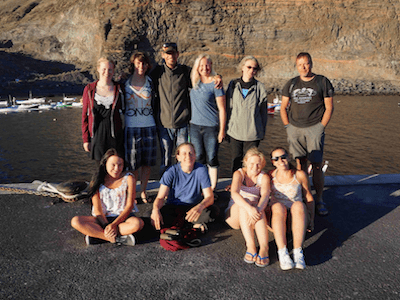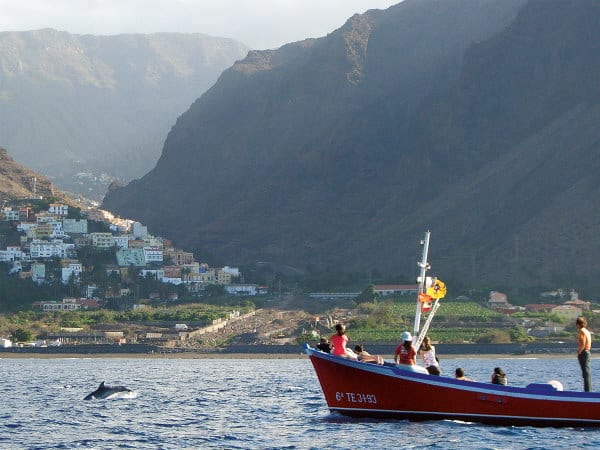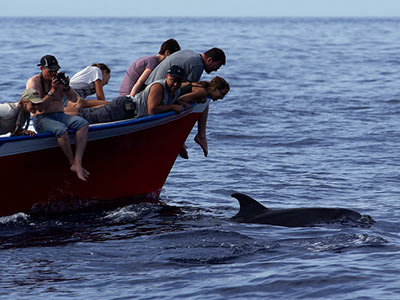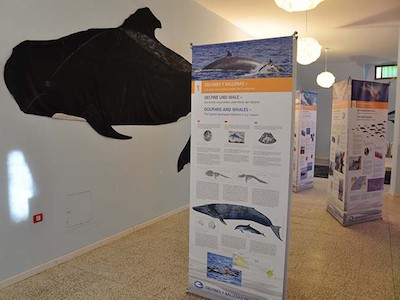
Project M.E.E.R. La Gomera
Off La Gomera’s south-west coast an almost uncomparable cetacean species diversity exists. More than 20 species of whales and dolphins have been identified here. There are some barely known and little researched cetacean species among them, as for instance the Blainville’s beaked whale (Mesoplodon densirostris) and the rough-toothed dolphin (Steno bredanensis). These waters therefore not only offer perfect conditions for whale watching, but also for conducting field research.
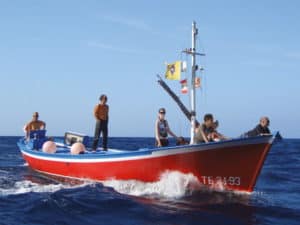 Already since 1994 daily whale & dolphin excursions are organized with small boats (which were formerly used for fishing), starting from the harbor Vueltas in Valle Gran Rey. These ‘dolphin trips’offered for locals and tourists, are an example for humans meeting these fascinating creatures in a respectful way.
Already since 1994 daily whale & dolphin excursions are organized with small boats (which were formerly used for fishing), starting from the harbor Vueltas in Valle Gran Rey. These ‘dolphin trips’offered for locals and tourists, are an example for humans meeting these fascinating creatures in a respectful way.
Since 1995 we have used the opportunity to compliment these regular trips with scientific research and public education. On this basis, the participants are provided with direct insight into both the practical work and the questions of modern cetacean research.
Furthermore, it is necessary to create a positive atmosphere among the population, the tourists and the political decision makers for marine conservation efforts. We do this through targeted environmental education.
Gomera develops rapidly – sustainability is a must!
With the current rapid development of (all-inclusive) tourism on La Gomera, danger is growing that whale watching becomes a purely commercial business – as has happened for instance on Tenerife and many other places in the world – and that an excessive expansion with according negative impacts on marine mammals has to be feared.
We seek to prevent such tendencies through interdisciplinary research and public information and – by cooperating with other organizations – through evolving alternative ways of action. Our central interest and purpose is a sustainable development.
The results of our studies are used for elaborating adaptive rules and regulations for whale watching. Our continuous sighting data collection is then used to inform policy makers when making their decisions.
Through scientific research, public education and cooperation with organizations and scientists, we have established an internationally well recognized best practice project: MEER La Gomera.

International environmental award for a BEST PRACTICE project
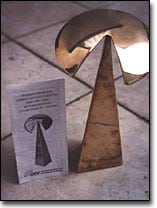
The project MEER La Gomera has been awarded the international environment prize ‘Tourism and Environment’ from the German Association of Travel Agencies and Tour operators (DRV). It has been highlighted as an ‘outstanding example of environmental friendly whale watching tourism’ which represents ’innovative new possibilities of cooperation in the area of research and tourism in an exemplary way’.
We inaugurated a trilingual permanent exhibition ‘Dolphins and Whales off La Gomera – Biodiversity in a World of Change‘, which became a milestone for our public education about the marine mammals of the island.
But there is still a lot to do. The environmental situation of the sea around the Canary Islands doesn’t develop to its best. With our work we want to contribute that the ecological settings for the whales and dolphins – and for us humans- continue functioning in the long-term.
More informationen on the permanent exhibition on La Gomera…
Further informationen on whale watching…
More information about our scientific research…
List of scientific publications of M.E.E.R. e.V.

